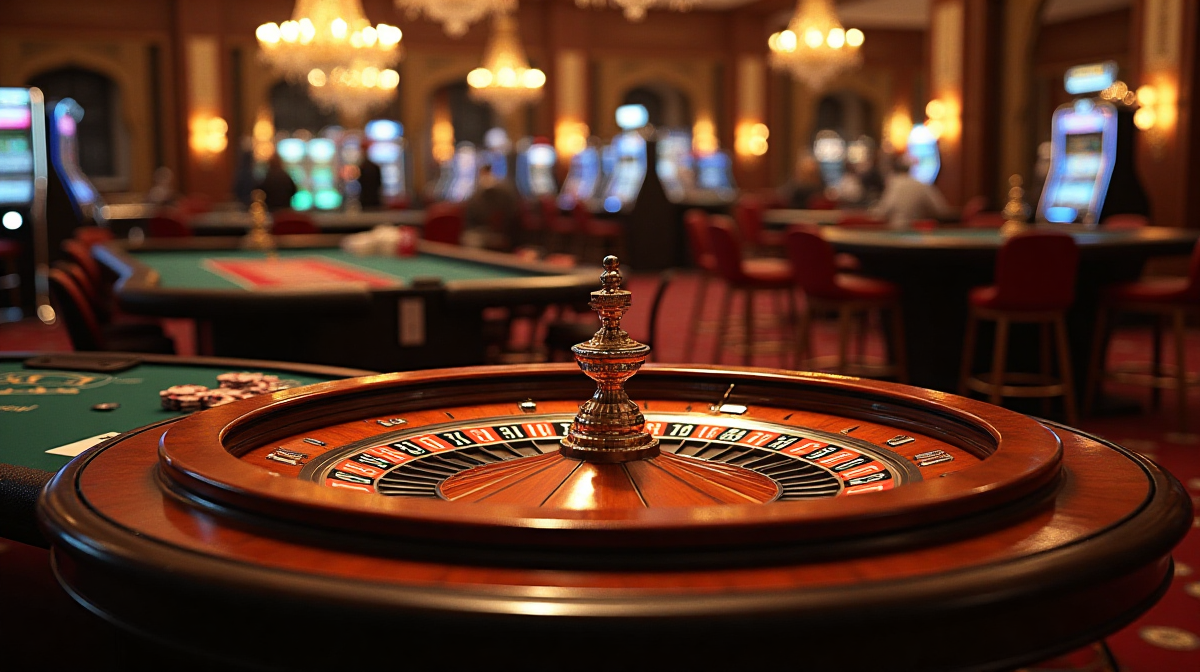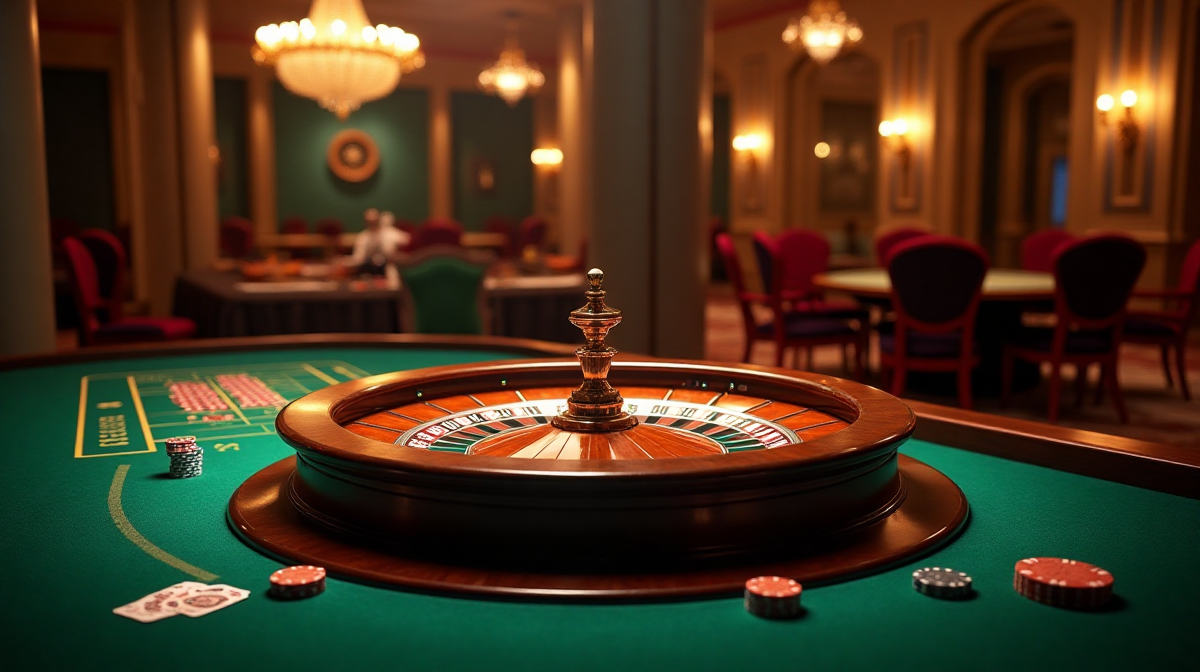Roulette Wheel History: From Zero to Now
A Brief Overview of Roulette's Enduring Popularity
Roulette, a game steeped in history and intrigue, continues to captivate players worldwide. From the opulent casinos of Monte Carlo to the convenience of online platforms, the spinning wheel holds a universally recognized appeal. Its simplicity, combined with the thrill of chance, has ensured its enduring popularity for centuries. Even today, platforms like Bet9ja offer diverse roulette options, proving its continuing relevance in the modern gambling landscape.
Setting the Stage: The Core Mechanics & Appeal
The core mechanics of roulette remain largely unchanged since its inception. Players bet on where a small ball will land on a spinning wheel divided into numbered pockets. This seemingly simple premise belies a surprisingly complex history, filled with mathematical calculations, political maneuvering, and societal shifts. The appeal lies in the unpredictable nature of the game – the sense that luck, and perhaps a little strategy, can lead to significant rewards.
Thesis Statement: Tracing Roulette's Journey from its Mysterious Origins to its Modern-Day Prevalence.
This article will trace the fascinating journey of the roulette wheel, from its debated origins and slow evolution in 18th-century France, to its widespread adoption and constant reinvention in the digital age. We will explore the key milestones, influential figures, and cultural forces that have shaped the game we know today, and touch upon its modern manifestations, particularly the accessibility provided through platforms like the bet9ja computer site.
The Early Days: Origins and Evolution (17th - 18th Century)
Possible Precursors: Games of Chance in Ancient Rome & Beyond
While pinpointing a singular source is difficult, games of chance resembling roulette can be traced back to ancient civilizations. Roman soldiers supposedly played a game involving spinning shields and wagering on where they would land. Similar games existed in ancient Greece and China, demonstrating a widespread human fascination with random outcomes.
Blaise Pascal & the Unintentional Invention (1655)
The closest ancestor to the modern roulette wheel is often attributed to Blaise Pascal, the French mathematician and physicist. In 1655, while attempting to create a perpetual motion machine, Pascal inadvertently invented a spinning wheel. Though not designed as a gambling device, it laid the groundwork for what would eventually become roulette.
The First Modern Roulette Wheels in France (Early 18th Century)
By the early 18th century, roulette began to take shape in France. Early versions differed from the modern game, but they included a spinning wheel and a ball. Initially, these wheels featured only red and black pockets, furthering the connection to games like buckshot roulette download apk, though that is a very different modern interpretation.
The Rise of Parisian Roulette Houses – Rouge et Noir
The first gambling houses offering roulette emerged in Paris. These establishments, often called “Rouge et Noir” (red and black), became popular gathering places for the aristocracy and wealthy. They were frequently illegal or operated in a legal grey area, adding to the game’s allure and mystique.
Early Wheel Designs & the Introduction of the Zero
The crucial addition of the zero pocket occurred during this period. Originally intended to provide the house with a slight edge, the zero fundamentally altered the game's odds. Some believe this innovation was created to combat cheating, but its primary effect was to increase the casino's profitability. In many cities, you might even find an 0ld mobile bet9ja shop still operating with similar principles.
The Spread of Roulette: European Expansion (19th Century)
Roulette Travels to Germany & Beyond: Introducing Single Zero Roulette.
As roulette’s popularity grew, it spread throughout Europe, particularly to Germany. German casinos adopted a version of the wheel with only a single zero, offering players slightly better odds compared to the French double-zero version.
The Baden-Baden Casino & Its Impact on Roulette Regulations
The prestigious Baden-Baden casino in Germany became a hub for roulette, attracting players from across Europe. This casino established some of the first formal regulations for the game, setting standards for wheel design and gameplay.
The Franco-German Rivalry and Wheel Variations
A competitive dynamic emerged between French and German casinos, leading to variations in wheel layout and rules. The French maintained the double-zero wheel while Germans favored the single-zero.
Early Gambling Culture and Societal Attitudes Towards Roulette
The 19th century witnessed the growth of a distinct gambling culture. While roulette was often associated with the upper classes, it also attracted individuals from various social backgrounds. Societal attitudes toward gambling fluctuated between disapproval and acceptance.

Roulette in America: A Double Zero Story (19th - Early 20th Century)
Transatlantic Journey: Roulette Arrives in the United States
Roulette crossed the Atlantic in the mid-19th century, brought by Frenchmen who established casinos in New Orleans. It swiftly gained popularity, becoming a defining feature of American gambling establishments.
The Introduction of the Double Zero (00) - Increasing the House Edge
American casinos adopted the double-zero wheel, further increasing the house edge. This decision, while advantageous for casino owners, proved controversial among players who preferred the lower house edge of the single-zero game.
Roulette's Growth in the Wild West & Saloons
As the American frontier expanded, roulette found its way into saloons and gambling halls throughout the Wild West. It became a staple of the gambling experience, offering a thrill to miners, cowboys, and settlers.
Early American Casino Culture & Corruption Concerns.
The burgeoning casino industry in America was often plagued by corruption and fraud. Concerns about rigged wheels and dishonest operators led to calls for regulation.
Attempts at Suppression & Gambling Bans
Due to widespread concerns about societal impacts, many states and territories implemented gambling bans. While these bans often drove gambling underground, they did little to eliminate it. You can now circumvent such restrictions using a Bet9ja account.
The 20th Century: Regulation, Innovation & Las Vegas
Post-Prohibition: Gambling Legalization & Re-emergence.
Following the repeal of Prohibition, there was a gradual shift toward the legalization of gambling in parts of the United States. Nevada became the first state to fully legalize casino gambling, paving the way for Las Vegas to become a global entertainment hub.
The Rise of Las Vegas: Roulette as a Casino Staple.
Las Vegas rapidly transformed into the world’s casino capital, and roulette became an integral part of its vibrant landscape. Iconic casinos invested heavily in roulette equipment and marketing, further cementing the game’s popularity.
Evolution of Casino Design & the Roulette Experience.
Casino design evolved to enhance the roulette experience. Luxurious settings, attentive service, and innovative table layouts all contributed to the allure of the game.
Technological Advancements: Electromechanical Roulette Wheels.
The 20th century witnessed technological advancements in roulette. Electromechanical wheels replaced traditional mechanical models, providing greater consistency and reliability.
The Impact of Mob Involvement & Casino Security.
The early Las Vegas casino industry was heavily influenced by organized crime. This period led to significant advancements in security measures aimed at preventing cheating and protecting casino revenue.
The Digital Revolution: Online Roulette & Beyond (Late 20th - 21st Century)
The Birth of Online Casinos & the Evolution of Online Roulette
The advent of the internet revolutionized the gambling industry. Online casinos emerged in the mid-1990s, offering players access to roulette and other games from the comfort of their homes.
Software-Based Roulette: RNG & Algorithm Development.
Online roulette utilizes Random Number Generators (RNGs) to simulate the randomness of the physical wheel. Sophisticated algorithms ensure fair and impartial results.
Live Dealer Roulette: Bridging the Gap Between Online & Physical Casinos
Live dealer roulette combines the convenience of online play with the human interaction of a physical casino. Players can watch and wager on a real dealer spinning a real wheel via live video stream.
Mobile Roulette: Accessibility & Convenience.
The rise of mobile gaming has made roulette more accessible than ever before. Players can now enjoy the game on their smartphones and tablets, anytime, anywhere. Bet9ja excels in providing a seamless mobile experience.
Technological Innovations: Augmented Reality (AR) & Virtual Reality (VR) Roulette.
Emerging technologies like Augmented Reality (AR) and Virtual Reality (VR) are transforming the roulette experience. VR roulette offers an immersive, 360-degree experience, while AR roulette overlays digital elements onto the real world.

Roulette Today: Trends, Statistics & Future Outlook
Global Roulette Popularity: Key Regions & Demographics.
Roulette remains incredibly popular worldwide, with significant markets in Europe, North America, and Asia. Demographic trends show broad appeal across age and gender groups.
Statistical Analysis: Common Betting Strategies & Probability.
Numerous betting strategies have been developed over the years, from the Martingale system to the Fibonacci sequence. Analyzing roulette statistics reveals the inherent probabilities and limitations of these strategies.
Current Roulette Variations: French, European, American & Multi-Wheel.
Various roulette variations exist, each offering unique rules and odds. French roulette features “La Partage” and “En Prison” rules, benefiting players. European roulette has a single zero, while American roulette has a double zero. Multi-wheel roulette allows players to wager on multiple wheels simultaneously.
The Future of Roulette: Blockchain, AI & Gamification.
Blockchain technology could offer enhanced transparency and security in online roulette. Artificial Intelligence (AI) is being used to detect fraud and personalize the player experience. Gamification elements, such as leaderboards and achievement badges, add an extra layer of excitement.
Responsible Gambling & Addressing Concerns Regarding Problem Gambling.
The gambling industry faces increasing scrutiny regarding problem gambling. Responsible gambling initiatives, such as self-exclusion programs and deposit limits, are essential for protecting vulnerable players.
Conclusion: The Enduring Legacy of the Roulette Wheel
Recap of Roulette's Journey Through History
From its obscure origins in 17th-century France to its global prominence in the 21st century, the roulette wheel has undergone a remarkable transformation. The history of roulette wheel is a tale of mathematical innovation, social acceptance, and constant adaptation.
The Wheel's Continued Relevance in Modern Entertainment
Despite the rise of newer casino games, roulette continues to maintain its relevance in modern entertainment. Its iconic imagery and simple gameplay ensure its enduring appeal.
Final Thoughts: The Roulette Wheel's Lasting Symbolism of Chance & Fortune.
The roulette wheel remains a potent symbol of chance and fortune. Whether played in a lavish casino or on a mobile device via Bet9ja, the spinning wheel continues to inspire hope, excitement, and the pursuit of luck.


